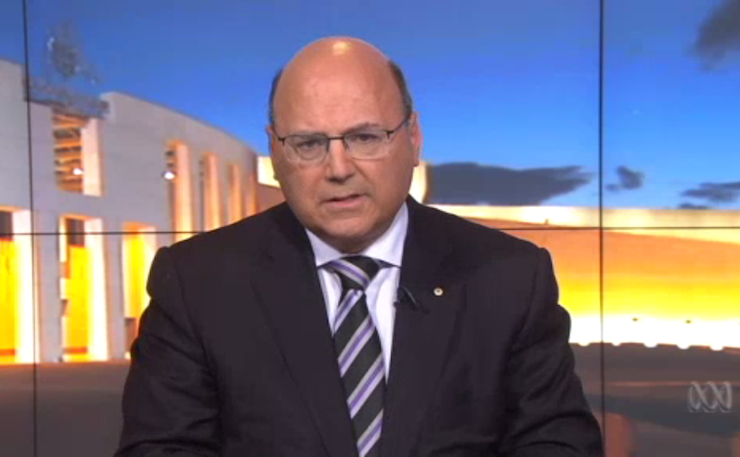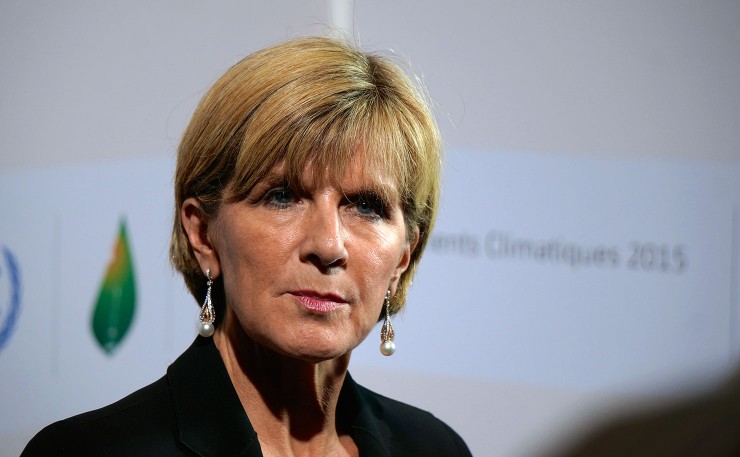Facing a backlash from its base, the party may have underestimated how many people its changes will impact, writes Ben Eltham.
We can all wish for a smooth “transition to retirement.” But the Coalition is finding that transition decidedly bumpy.
Julie Bishop is normally one of the government’s most assured media performers. So it was something of a surprise this week to find the Foreign Minister cornered by wily Melbourne radio host Neil Mitchell on the issue of the government’s budget changes to superannuation tax.
Neil Mitchell: Are you aware of the transition to retirement scheme?
Julie Bishop: I’m certainly aware that we have one, yes.
Mitchell: How does it work?
Bishop: Well, Neil, this is obviously a ‘gotcha’ moment. It’s not my portfolio.
Mitchell: This is the point. Neither you or Josh Frydenberg understand transition to retirement, and this is where you’re hitting average people, not the fat cats, the average people.
As Bishop backpedalled, Mitchell told her that “people on 70 grand are ringing me.”
“It’s hitting them. They’re not fat cats are they?” he enquired.
Super is famously complex and few would expect the Foreign Minister to be across all the details of the policy area. But the thorny issue highlighted the problem the government has when it comes to superannuation policy.
On budget night, Morrison sold the impact of the superannuation changes as affecting only the top 4 per cent. That has continued to be the government’s line on the issue: that the majority of superannuants will either be unaffected or better off.
The government’s changes affect only a few hundred thousand wealthy Australians. Unfortunately for the government, self-funded retirees are a Coalition constituency. The screams emanating from the Liberal Party base are cries of genuine rage at what some see as a betrayal. As I’ve remarked before, the one per cent are dangerous adversaries.
The real problem for the government is that the super controversy threatens to break loose from the top one per cent and out into broader Australian society. That’s because of the changes affecting the “transition to retirement” (TTR) rules.
At this point we need to talk about the details of superannuation tax concession policy, so if you want to skip ahead I won’t blame you.
“Transition to retirement” rules allow 56-65 year olds to dip into their superannuation savings as they work less, but pay no tax on that. The reason is that it is so-called “non-commutable income.” These can’t be paid out as a lump sum.
Transition-to-retirement income is not taxed, so the effect of using it for older Australians is to reduce their overall tax burden, even while they’re still working.
In its detailed 2015 report into Australia’s post-retirement income system, the Productivity Commission described “transition to retirement” in the following way:
A transition to retirement pension (TTR pensions) can be used to increase income, make a gradual transition to retirement (by supplementing income) or boost superannuation savings and minimise income tax for individuals.
The government’s budget changes upped the tax rate on TTR pensions from zero to 15 per cent. That’s still a very generous tax concession, the benefits of which will flow mainly to the wealthiest two-fifths of the semi-retired. But it is a tax increase, none-the-less. For a median income earner accessing the TTR pension as a way of maintaining income while working less, it could potentially represent a cut to their take-home weekly income.
The government appears to have miscalculated how many people the TTR changes will impact. Last year, the Productivity Commission estimated that about 115,000 superannuants would be affected. But the Commission also admitted that it don’t really know how many people are accessing TTR. Industry lobby groups are suggesting it could be closer to half a million.
In truth, no-one knows: the Australian Prudential Regulatory Authority doesn’t collect the data, except for self-managed super funds. “It is difficult to ascertain how many people are using TTR pension arrangements, and for what purpose,” the Commission’s supplementary paper on post-retirement superannuation policy admitted.
To the government’s embarrassment, no official modelling of the transition-to-retirement changes seems to have been undertaken before they were handed down in the May budget.
The anger over super is certainly making itself felt in the campaign.
 Cabinet Secretary Arthur Sinodinos has sensitive antenna for the vibrations of the party room. He told Sky News yesterday that it wasn’t consulted on many of the details of the budget super changes. He hinted broadly that, should the Coalition win the election, some of the super tax increases could be reversed. “The next process will be if we win the election there will be consultations on various changes and then legislation presented to the party room,” Sinodinos said.
Cabinet Secretary Arthur Sinodinos has sensitive antenna for the vibrations of the party room. He told Sky News yesterday that it wasn’t consulted on many of the details of the budget super changes. He hinted broadly that, should the Coalition win the election, some of the super tax increases could be reversed. “The next process will be if we win the election there will be consultations on various changes and then legislation presented to the party room,” Sinodinos said.
Western Australian Liberal backbencher Ian Goodenough is famous for his enthusiastic engagement with local constituents. He has gone public with his concern about the policy.
“I have received a volume of correspondence from constituents objecting to the changes, it is a significant issue in this election, Goodenough told the ABC yesterday. “However, the dilemma is to identify another area of revenue to target given the constraints with the budget situation.”
The irony of the Coalition backlash is that on this issue at least, Turnbull and Morrison really are speaking truthfully: the government’s super tax concession changes are relatively mild and relatively progressive. They really do affect only the top few per cent of retirees.
As the Productivity Commission noted last year, transition to retirement seems to mainly be used by wealthy superannuants as a tax minimisation measure. In 2011-12, apparently, the majority of TTR pension recipients were actually working full-time. This meant they were in effect salary sacrificing a proportion of the income at a tax rate of zero. The Productivity Commission rather coyly suggests that, for these workers, “incentives relating to taxation may have been a more relevant consideration than reducing working hours in the lead-up to retirement.”
But it also seems clear that ordinary middle-income earners are using the scheme as an income top-up in the run-up to their retirement. This is surely a positive social and economic outcome that superannuation policy shouldn’t penalise.
The way to keep the incentive for work while protecting the scheme from being rorted seems simple enough: means test it. But the government didn’t means test the measure. It now appears clear that, in the absence of a means test or any proper modelling, the government simply didn’t realise the tax hike would affect middle Australia.
The superannuation blow up has caught Turnbull and his team unguarded. An attack from the Liberal right on super is the last thing the government needs as it ramps up its campaign against Labor’s supposedly “anti-business” policies.
Scott Morrison gave a farcical media conference this morning in which the military metaphors (“Labor’s war on growth”) flowed freely. In an increasingly common occurrence for the Coalition in this campaign, the assault ran into early trouble in face of unforced errors and his own grandiosity.
So far, Turnbull is refusing to abandon the transition to retirement tax hike. But don’t rule another backflip, and soon.
Donate To New Matilda
New Matilda is a small, independent media outlet. We survive through reader contributions, and never losing a lawsuit. If you got something from this article, giving something back helps us to continue speaking truth to power. Every little bit counts.





